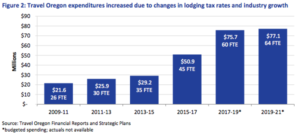
By CLAIRE WITHYCOMBE/Oregon Capital Bureau
SALEM — The semi-independent Oregon agency overseeing tourism initiatives should be more transparent about managers’ pay and strengthen controls on contracting, Secretary of State Bev Clarno said in an audit report released Thursday.
The Oregon Tourism Commission — also known as Travel Oregon — is a small agency that is supposed to help boost Oregon’s $11.8 billion tourism industry. It has seven regional sub-agencies that focus on specific areas of the state, including the Oregon Coast Visitors Association, which handles tourism promotion and training along the entire stretch of the coast.
While Travel Oregon is subject to government ethics and public records and meetings laws, it is exempt from some laws that govern public spending and pay.

“Travel Oregon is not subject to many of the existing mechanisms that provide oversight, transparency, and accountability for taxpayer dollars,” auditors wrote. “With continuous funding, autonomy, and exemption from some state laws, it is therefore even more important for Travel Oregon to be independently transparent and accountable about its use of taxpayer dollars to ensure appropriate stewardship of public funds.”
The agency’s budget has tripled in the past decade, due in part an increase the lodging tax rate in 2016. That’s where the agency gets its revenue.
Travel Oregon, at about $39 million per year, now has the eighth-largest state tourism budget in the country and ranks sixth among state governments spending on tourism per capita.
The agency could seek more competitive for services like marketing, the auditors wrote. About half of the agency’s two-year budget goes toward marketing.
Auditors looked at 77 contracts the agency entered between 2017 and 2019, finding that Travel Oregon has “sufficient” procedures to oversee contracts. But some vendors didn’t issue invoices that had the level of detail that the contracts required, and in two cases vendors sought reimbursement for travel expenses not allowed in their contracts.
Auditors also pointed to management salaries, finding that managers at Travel Oregon “are some of the highest compensated managers” compared to managers at state agencies who “oversee more expansive and complex budgets; manage large numbers of employees and contractors; and perform many diverse, technical and critical government services, including essential public health and public safety responsibilities.”
Executive salaries at Travel Oregon have increased 76 percent since 2012. As of last June, its chief executive officer, Todd Davidson, is being paid $381,000 a year, including a car and cell phone allowance. The Oregon Tourism Commission has since given Davidson a 3 percent raise, The Oregonian/OregonLive reported Thursday.

“While the Oregon Tourism Commission has the freedom to set the CEO’s compensation and the CEO to set the employees’ compensation, the agency should take steps to ensure it is accountable to taxpayers for how it decides to compensate staff with public monies,” auditors wrote.
By comparison, Department of Human Services Director Fariborz Pakseresht, who leads Oregon’s largest state agency with roughly 8,600 employees, was paid $200,388 as of June. Travel Oregon employs 60 people.
The Oregonian/OregonLive said this and other findings of the audit will likely raise questions for already skeptical lawmakers whom Gov. Kate Brown has asked to approve an increase in the statewide tourism tax that largely funds Travel Oregon. The tax hike is part of Brown’s plan to secure an additional $20 million for the 2021 World Athletics Championships in Eugene, for a total of $40 million in state funding.
As The Oregonian/OregonLive reported last week, Travel Oregon’s budget has surged more than 50 percent to $39.3 million annually and its payroll has also grown since lawmakers nearly doubled the statewide tourism lodging tax that largely funds the funds the agency in 2016. The 33 percent increase in payroll occurred despite Travel Oregon’s assurance to the Legislature in 2016 that the influx of tax money would result in more distribution to tourism programs but “is not anticipated to increase the administrative staffing of the commission,” auditors pointed out.
The current 1.8 percent tax is going to drop to 1.5 percent in July 2021, unless lawmakers make it permanent by passing House Bill 4047.
The only state government employee with a salary higher than Davidson’s in June was the chief investment officer, who oversees an approximately $81 billion investment portfolio.
Travel Oregon managers told auditors that they based the salaries on an analysis of comparable salaries commissioned in 2016. But The Oregonian/OregonLive reported that when auditors asked to see details of that study, Travel Oregon managers were unable to supply details and could not even locate evidence of a contract with the compensation consultant. As a result, “we were unable to independently verify the basis for the increase in the CEO’s and management’s compensation,” auditors wrote.

As a semi-independent agency, Travel Oregon is not subject to state personnel rules, auditors wrote. However, its employees still do receive the same pensions and other generous retirement benefits as other state employees. The nine-member tourism commission, whose members are appointed by Gov. Kate Brown and confirmed by the state Senate, oversees Travel Oregon’s budget and the CEO’s performance and compensation.
Auditors said the agency could improve its controls over contracts, should consider whether to put all contracts out for a competitive bid above a certain cost, and retain studies by consultants and other documents to “support compensation decisions” and provide compensation information to the nonpartisan Legislative Fiscal Office when the agency reports its revenues and expenses.
They also pointed out the agency’s largest advertising contract had not been competitively bid since 2010 and suggested the agency use competitive bidding more often. Travel Oregon, which does not have to use a competitive bidding process since it is exempt from state contracting rules, paid Wieden+Kennedy $24.5 million since 2013, auditors found. As auditors were wrapping up their work, Travel Oregon published the bid for contract Jan. 2.
In a response to the audit, Davidson agreed with recommendations to tighten fiscal procedures and provide a more defensible explanation for employee compensation. But Davidson also said his agency is doing what it is supposed to do: bring tourists to Oregon.
The Oregon Capital Bureau in Salem is staffed by reporters from EO Media and Pamplin Media Group and provides state government and political news to their newspapers and media around Oregon, including YachatsNews.com


